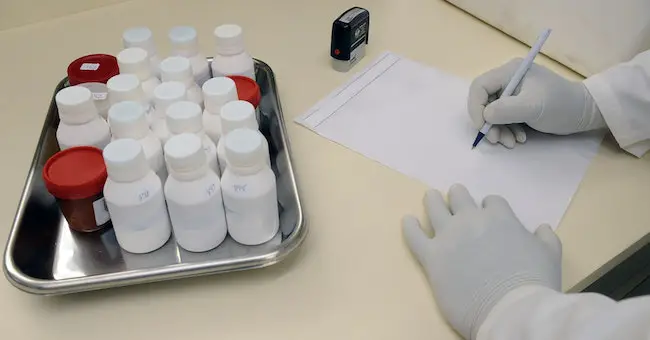What Happens If You Drink Alcohol With Dexamethasone?
Dexamethasone is a corticosteroid medicine that suppresses the immune system and reduces inflammation. Consuming alcohol while on dexamethasone may raise your risk of gastrointestinal irritation and ulcers.
Alcohol use can potentially diminish the effectiveness of dexamethasone by increasing the medication’s breakdown and removal from the body. This has the potential to reduce dexamethasone’s intended therapeutic effects.
When taking dexamethasone or any other corticosteroid medicine, it is typically advised to avoid or limit alcohol consumption.
How Alcohol Affects the Body
Alcohol is a favored and legal recreational drug that millions of individuals worldwide consume. While moderate consumption of alcohol is usually considered safe, excessive consumption can have negative effects on your body.
Effects on the Brain
The brain is affected by alcohol by changing neurotransmitter levels, which are the chemical compounds that transmit signals to the brain. It increases the neurotransmitter inhibitory gamma-aminobutyric acid (GABA), which slows brain activity, leading to relaxation and sleepiness. However, alcohol inhibits the excitatory neurotransmitter glutamate, reducing motor and cognitive performance.
The short-term effects of alcohol on the brain can result in diminished judgment, reduced inhibitions, and impaired motor coordination. Long-term use of alcohol can result in permanent cognitive impairment and brain damage, including confusion, memory loss, and difficulties learning new information.
Alcohol use disorder (AUD) is an illness in which the person is experiencing a troublesome pattern of drinking and has difficulty regulating their intake of alcohol, cravings, and withdrawal symptoms. AUD can cause permanent changes to the brain’s structure, function, and structure, thereby increasing the likelihood of anxiety, depression, and other mental health issues.
Effects on the Liver
The liver’s role is to metabolize and remove alcohol from the body. When someone drinks alcohol, the liver breaks it down to acetaldehyde. This is an endocrine-disrupting substance that can cause damage to liver cells. In time, excessive consumption of alcohol can cause swelling and scarring in the liver. This is known as “alcoholic liver disease.”
The earliest phases of alcohol-related liver disease may cause the development of fatty liver, a reversible disease in which the liver cells are stuffed with fat. If the person continues to drink, alcohol, the problem can develop into alcoholic hepatitis, which is an inflammation of the liver. In extreme instances, alcoholic hepatitis could cause liver failure and death.
Effects on the Heart
Moderate consumption of alcohol has been proven to provide certain health benefits, for instance, decreasing the risk of developing heart disease. However, drinking too much alcohol may have negative effects on the heart. Alcohol can cause an erratic heartbeat, also known as atrial fibrillation. This could increase the risk of a heart attack or stroke.
Consuming alcohol regularly can cause heart muscle weakness, causing cardiomyopathy, where the heart gets larger and less efficient at pumping blood. This could cause heart failure, a serious and potentially life-threatening issue.
Effects on the Pancreas
Alcohol consumption can affect the pancreas, an organ that produces enzymes that aid digestion and hormones that control blood sugar levels. Drinking excessively can cause inflammation of the pancreas. This is known as pancreatitis. This causes severe abdominal pain, nausea, and vomiting.
In extreme cases, pancreatitis may cause permanent damage to the pancreas, which can lead to diabetes and poor absorption of nutrients. Chronic pancreatitis also increases the chance of developing pancreatic cancer.
Dexamethasone and Alcohol: A Dangerous Combination
Dexamethasone is a medication that can treat various ailments, such as allergies, inflammation, and certain kinds of cancer. While dexamethasone is an effective treatment, it’s important to know the possible risks when using it, especially when combined with alcohol.
How Dexamethasone Works
Dexamethasone works by reducing the immune system as well as decreasing inflammation. It is often used to treat asthma, rheumatoid arthritis, and inflammatory bowel diseases. Dexamethasone can also treat and prevent nausea and vomiting triggered by chemotherapy.
Dexamethasone can be taken orally or in the vein. You must follow the dosage guidelines given by your physician and take the medication according to the directions.
Combining alcohol and dexamethasone may increase the likelihood of adverse effects, especially stomach-related symptoms like nausea, vomiting, and abdominal pain. Additionally, alcohol may be a factor in other drugs that could be prescribed with dexamethasone, thereby increasing the risk of adverse side effects.
Dexamethasone’s long-term use can cause a range of side effects, such as weight gain, mood swings, and an increased risk of developing infections. When it is combined with alcohol, the likelihood of these side effects increases.
Precautions When Taking Dexamethasone
If you’re taking dexamethasone, it is crucial to limit or avoid drinking alcohol. It is also important to inform your doctor of other medications since some may interact with dexamethasone.
It is essential to adhere to the dosage guidelines you receive from your healthcare provider and the dosage instructions as prescribed. Don’t stop taking dexamethasone before consulting your healthcare professional, since this could result in withdrawal symptoms.
If you suffer any adverse consequences while taking dexamethasone, like nausea, vomiting, or abdominal pain, consult your doctor. These symptoms could indicate a serious problem and should be assessed by a medical professional.
How to Avoid Mixing Alcohol and Dexamethasone?
If you’re taking dexamethasone, it is essential to know the dangers associated with mixing the drug with alcohol. As discussed in the previous article, mixing dexamethasone and alcohol can reduce the drug’s efficacy and raise the chance of adverse effects.
Inform Others of Your Medication Use
If you’re on dexamethasone, informing people about the medication you are taking is crucial, especially in social settings where alcohol might be present. Informing others that you’re on medication and do not drink alcohol can help avoid situations where you could be attracted to mixing both.
If you are worried about how others will react to your medication use, you should talk to a therapist or counselor. A therapist or counselor will provide strategies to communicate your medication usage unambiguously and confidently.
Seek Help If Necessary
If you’re trying to avoid mixing alcohol with dexamethasone, it could be necessary to seek assistance. You should consider speaking with a health professional, counselor, or therapist who can offer assistance and ways to avoid drinking alcohol while taking the medication.
Additionally, you might consider joining a support group or rehabilitation program. The programs will provide additional assistance and resources to assist you in avoiding mixing dexamethasone and alcohol.
Risks of Binge Drinking Dexamethasone
Dexamethasone is an effective medication for steroid use. It is used to treat various medical conditions like allergies, inflammation, and autoimmune conditions. However, combining dexamethasone and alcohol could have serious repercussions, particularly when drinking heavily.
Decreased Effectiveness of Dexamethasone
One of the biggest risks of drinking excessively with dexamethasone’s effects is that it can reduce the drug’s efficacy. Dexamethasone acts by reducing the immune system and decreasing inflammation within the body. However, alcohol can affect the body’s capacity to absorb and process dexamethasone. This can lead to a decrease in the effectiveness of the drug.
Drinking during a binge can also lead to dehydration, which may decrease the efficacy of dexamethasone. If your body is dehydrated, it might not be able to absorb medication as efficiently, which can cause a decrease in the efficiency of dexamethasone.
Interference with Healing and Recovery
Drinking alcohol with dexamethasone in large quantities can also affect the healing process and rehabilitation. Dexamethasone is frequently used to decrease inflammation and encourage healing within the body. However, alcohol can hinder this process by hindering the body’s capacity to absorb and process dexamethasone. This could lead to longer recovery times.
In addition, drinking excessively can lead to dehydration, slowing healing and recovery. Dehydration can cause electrolyte imbalances, which could be harmful if left untreated.
Increased Risk of Addiction and Dependence
In the end, drinking excessively with dexamethasone may increase the chance of dependence and addiction to both dexamethasone and alcohol. Drinking excessively can trigger an addiction cycle where people feel they need alcohol to feel normal or manage stress. In the same way, dexamethasone can also be addictive, particularly when taken in large doses or for long periods of time.
Combining alcohol and dexamethasone could increase the risk of developing alcoholism and drug addiction. This is because both substances alter the brain’s reward center, making it difficult for someone to stop using the substances once they have begun.
Symptoms of Alcohol and Dexamethasone Interaction
Dexamethasone and alcohol are two compounds that should not be mixed since the combination can cause various health problems and symptoms.
Gastrointestinal Symptoms
One of the most frequently reported symptoms of dexamethasone and alcohol interactions is digestive distress. Alcohol can irritate the stomach lining and lead to symptoms like nausea, vomiting, and stomach discomfort. Dexamethasone may also cause stomach discomfort, ulcers, bleeding, and even
If dexamethasone and alcohol are combined, digestion symptoms are more severe. C bleeding and stomach ulcers may increase, and nausea and vomiting could be more severe. In some instances, combining dexamethasone and alcohol may cause serious gastrointestinal problems, including bleeding from the gastrointestinal tract.
Changes in Mood and Behavior
Another sign of the interaction between dexamethasone and alcohol is a change in behavior and mood. Both dexamethasone and alcohol can affect the nervous system and brain and cause changes in behavior, mood, and cognitive functioning.
Alcohol is a depressant that can cause brain activity to slow down and cause feelings of euphoria or relaxation. Dexamethasone, on the other hand, may trigger mood changes, including anxiety, irritability, and depression. When these drugs are combined, the possibility of experiencing mood changes and behavioral issues increases.
In certain instances, combining dexamethasone and alcohol can trigger extreme mood changes like paranoia, aggression, and hallucinations. These symptoms can be hazardous and require immediate medical attention.
Impaired Coordination and Balance
Dexamethasone and alcohol can affect balance and coordination, impairing physical function and increasing the chance of injuries or accidents. Alcohol is a depressant of the central nervous system, which can slow down reaction speed and reduce judgment, making it difficult to control movements and balance.
Dexamethasone may also affect balance and coordination, particularly in high doses. When dexamethasone and alcohol are combined, the possibility of impaired balance and coordination increases. This can be especially risky for those who work with heavy equipment or drive while intoxicated by alcohol or dexamethasone.
Cardiovascular Symptoms
Additionally, alcohol and dexamethasone interactions can cause heart-related symptoms. Alcohol can raise the heart rate and blood pressure, which could add stress to the cardiovascular system and heart. Dexamethasone may also influence the cardiovascular system, increasing the likelihood of high blood pressure and heart disease.
If these substances are combined, the risk of developing cardiovascular symptoms is increased. This could include symptoms like chest pain, palpitations, and breathlessness. In certain instances, combining dexamethasone and alcohol could cause serious cardiovascular issues, including stroke or heart attack.
How to Safely Consume Alcohol While Taking Dexamethasone?
It’s not generally advised to drink alcohol when taking dexamethasone due to the potential dangers and interactions between the two drugs. If you decide to drink alcohol in conjunction with dexamethasone, there are some precautions that you should take to reduce the risk and ensure security.
Talk to Your Doctor
The first step to ensuring you do not drink alcohol when taking dexamethasone is to talk to your doctor. Your doctor can advise on the possible dangers and interactions between dexamethasone and alcohol and whether it is safe to drink alcohol while taking this drug.
A doctor may also determine if you’re taking a high or low dose of dexamethasone and if any other medications you’re taking may affect alcohol. In light of this, your physician will give you advice on the amount of alcohol you can safely consume in the event that you have any.
Monitor your Symptoms
It is essential to keep track of your symptoms closely when taking alcohol while taking dexamethasone. If you notice any unusual symptoms or adverse effects, like stomach discomfort or mood changes, behavior or balance issues, impaired coordination, or cardiovascular symptoms, quit drinking alcohol and consult your physician immediately.
Suppose you have a history of alcohol abuse or addiction or suffer from liver disease or other health issues that may be influenced by alcohol. In that case, it’s especially important to monitor your symptoms closely and avoid drinking alcohol in general.
Avoid Mixing Alcohol with Other Drugs
It is also important not to mix alcohol with other drugs when taking dexamethasone. Alcohol interacts with various medications, such as over-the-counter, prescription, and herbal supplements.
Combining alcohol with other drugs could increase the risk of adverse reactions and possibly dangerous interactions. If you take other medications as well as dexamethasone, consult your doctor to determine if it’s safe to drink alcohol while taking these medications.
Alternatives to Consuming Alcohol While Taking Dexamethasone
Although it is not recommended to drink alcohol while taking dexamethasone because of the potential for interactions and risks, some alternatives are worth considering to prevent the problems that can arise from drinking alcohol while taking this drug.
Choose Non-Alcoholic Beverages
Another option to drink alcohol while taking dexamethasone is to select non-alcoholic drinks. There are many non-alcoholic drinks available that are equally enjoyable as alcohol-based drinks. These include carbonated drinks, mocktails, juices, and non-alcoholic beer or wine.
If you’re going to social gatherings, it is advisable to select a non-alcoholic drink and stay with it throughout the evening. This will allow you to feel like you’re part of the celebration without the risk of drinking alcohol when taking dexamethasone.
Engage in Alternative Activities
Another option for drinking alcohol when taking dexamethasone is to engage in other activities. Various options are the same as alcohol consumption, for example, watching a movie, checking out the latest restaurant, or attending the stadium or a concert.
Participating in activities that require physical effort, like yoga or exercise, is beneficial to ease stress and improve overall health and well-being. These kinds of activities are especially beneficial for those who may use dexamethasone to manage anxiety or stress symptoms.
Seek Professional Support
If you’re trying to avoid alcohol when taking dexamethasone, seeking help from a professional could be beneficial. This may include talking with your physician or an expert in mental health who can offer advice and assistance.
Furthermore, support groups, like Alcoholics Anonymous, can provide an environment of support in which you can interact with people who have also decided to stay away from alcohol. These groups can offer accountability and support while you work to avoid alcohol consumption when taking dexamethasone.
FAQ’s
Can you drink alcohol while taking dexamethasone?
Answer: It is generally not recommended to drink alcohol while taking dexamethasone as it can increase the risk of stomach ulcers and gastrointestinal bleeding.
What are the potential side effects of combining alcohol and dexamethasone?
Answer: Combining alcohol and dexamethasone can increase the risk of side effects such as nausea, vomiting, stomach pain, dizziness, and headaches. It can also increase the risk of developing high blood pressure and diabetes.
How long should you wait to drink alcohol after taking dexamethasone?
Answer: It is recommended that you wait at least 24 hours after taking dexamethasone before drinking alcohol.
Can alcohol reduce the effectiveness of dexamethasone?
Answer: Alcohol can interfere with the absorption and metabolism of dexamethasone, potentially reducing its effectiveness.
Can alcohol interact with other medications that are taken with dexamethasone?
Answer: Yes, alcohol can interact with other medications that are taken with dexamethasone, potentially increasing the risk of side effects and reducing their effectiveness.
What should you do if you accidentally drink alcohol while taking dexamethasone?
Answer: If you accidentally drink alcohol while taking dexamethasone, it is important to monitor yourself for any signs of side effects. If you experience any symptoms such as stomach pain, nausea, or vomiting, seek medical attention immediately. It is also important to inform your healthcare provider about the alcohol consumption so that they can adjust your medication regimen if necessary.



















